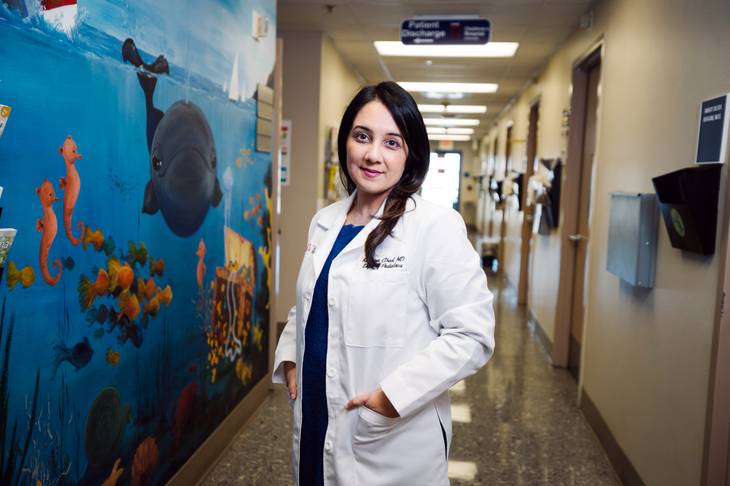A love of science and the study of medicine fueled Dr. Rooman Ahad’s career and led her to a role as assistant professor of pediatric neurology at UNLV’s School of Medicine. She is now part of an effort to expand autism services in the Las Vegas Valley and raise awareness through education and events such as the Grant a Gift Autism Foundation Race for Hope 5K, which was run April 27 at UNLV.
April is Autism Awareness month, so tell us how autistic spectrum disorders are diagnosed.
Autism spectrum disorders can be diagnosed in a variety of ways. Pediatricians can do a screening tool in their office to start and then refer patients to a specialist such as a pediatric neurologist, child psychiatrist or developmental pediatrician. In our clinic, we make the diagnosis based on the DSM 5 criteria — we take a full history and do an evaluation on each child in the office. We have identified children as young as 18 months old. Typically, I give the diagnosis around 2 1/2 to 3 years of age. Of course, each case is different and it is never too late to have your child evaluated.
What therapies and treatments are available for those with autism?
As we learn more about autism, we also learn about what is working to help children on the spectrum. A good place to start if your child has speech delay is with speech therapy. If children are experiencing sensory seeking behaviors or sensory integration difficulties, occupational therapy is quite helpful. We also know Applied Behavioral Analysis therapy, or ABA, is helpful in helping a child with delays in speech, social skills and behavioral concerns.
Medications are also available to help treat comorbid conditions seen with children on the spectrum. For example, I often treat children with ADHD, sleep disturbance and seizures who also happen to be on the spectrum.
Are medications useful in treating the behavioral problems of autistic children?
Yes, but I always like to start with therapy. If therapy is not optimal, then I discuss medication options with families in conjunction to therapy. I find many children respond well to a combination of both behavioral therapy and pharmacotherapy.
What are some tips for parenting kids with autism?
Parenting is tough. Parenting a child with special needs is even tougher. I think patience is important, but also not being afraid to encourage your child to try new things or working with them to overcome a fear- or anxiety-provoking situation. I also encourage parents to reach out to other families for support. This is so important; it builds connections and you don’t feel as though you are navigating this challenging situation alone.
What is the difference between treating an adult vs. a child with autism?
I mainly treat children on the spectrum. When my patients become adults, they are usually transitioned into the adult medical world, which can be daunting. As they become older, their needs change. They also become more socially aware, so sometimes anxiety becomes more of an issue. I do really enjoy seeing the patients grow and watching them become more independent. Adult patients have different needs. They need to learn how to navigate in the adult world, find jobs if possible, work on self-care, driving, etc.
What local support groups or programs are available for people on the autism spectrum?
The Ackerman Center at UNLV is a great resource for families. Also, autismspeaks.org is a great online resource for families. Grant a Gift for Autism is also a great place for families to turn to for guidance and help.
If you could change one thing about Southern Nevada, what would it be?
I would really like to see a comprehensive network of pediatric subspecialists come together to serve the needs of the special needs community. There are so many children with special needs that require multiple subspecialists to care for them.
This becomes challenging for families as well as physicians. If there was a comprehensive center where care was coordinated, the quality of health care would definitely improve.
How do you decompress after a long work week?
I spend time with my family and work out. We love to explore, hike, cook and bake together. My kids are fairly young, so when I’m home, I have to put my mom hat on and put my phone away.
I also spend a fair amount of time volunteering with high school students who are interested in medicine.
If you could live anywhere else in the world, where would it be?
Chicago — the best city in the world — is my first and forever home.
What is something that people might not know about you?
I’m secretly a big nerd — I love books, collecting books, reading books, swapping books. There is something so enchanting about losing yourself in a great story. I also have a large Persian poetry collection.
What advice do you have to offer aspiring physicians?
Work hard and do what you love. Medicine is not a job, it’s a calling and a career.
